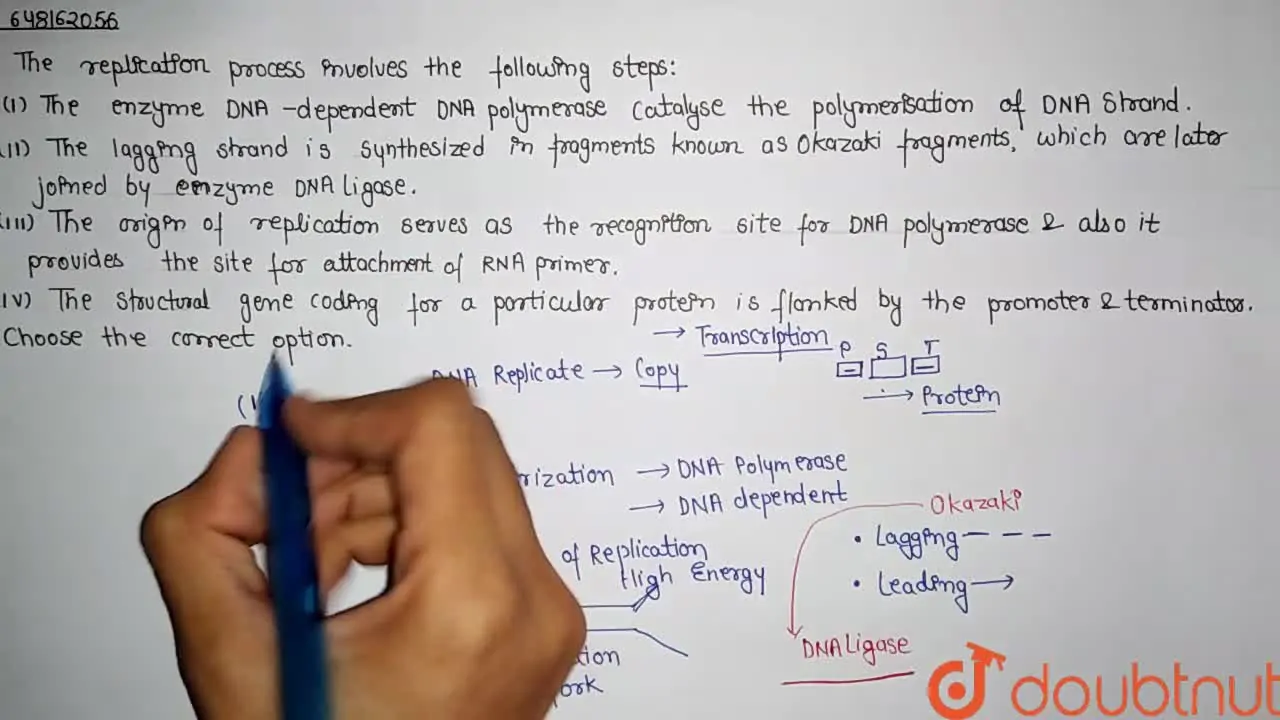The replication process involves the following steps:
(I) The enzyme DNA-dependent DNA poly merases catalyse the polymerisation of DNA strand.
(II) The lagging strand is synthesized in frag ments known as Okazaki fragments, which are later joined by the enzyme DNA Ligase.
(III) The origin of replication serves as the recognition site for DNA polymerase and also it provides the site for attachment of RNA primer.
(IV)The structural gene coding for a partic ular protein is flanked by the promoter and terminator.
Choose the correct option:
(I),(II)
(III),(IV)
(I),(II),(III)
(I),(II),(III),(V)
The correct Answer is:C
The replication process involves the following steps:
(1) Initiation or Formation of replication fork: In Long DNA molecules, the two strands of DNA cannot be separated in its entire length because it requires high energy, thus replication occurs within a small opening of the DNA helix, which is called replication fork.
(2) Elongation or Polymerisation: The enzyme. DNA- dependent DNA polymerases catalyse the polymerisation of DNA strand. This elongation is unidirectional, means it occurs only in one direction, i.e., 5. → 3.. As a result, the replication on one strand having polarity 3. → 5. is continuous, whereas on the other strand having polarity 5. → 3., the replication is discontinuous.
(3) The DNA strand that is formed in a continuous manner is called as leading discontinuously is called as lagging strand.
(4) The lagging strand is synthesized in fragments known as Okazaki fragments, which are later joined by the enzyme DNA Ligase.
Related Playlists
- BOOK - EDUCART PUBLICATIONCHAPTER - SAMPLE PAPER 4 (SOLVED)EXERCISE - SECTION-B24videos
SAMPLE PAPER 4 (SOLVED)
- BOOK - EDUCART PUBLICATIONCHAPTER - SAMPLE PAPER 4 (SOLVED)EXERCISE - SECTION -C12videos
SAMPLE PAPER 4 (SOLVED)
- BOOK - EDUCART PUBLICATIONCHAPTER - SAMPLE PAPER 3EXERCISE - SECTION - C12videos
SAMPLE PAPER 3
- BOOK - EDUCART PUBLICATIONCHAPTER - SAMPLE PAPER 5EXERCISE - SECTION- C2videos
SAMPLE PAPER 5
Similar Questions
The DNA dependent DNA polymerase catalyse polymerisation in -
View SolutionDNA polymerases catalyse polymerisation in
View SolutionEnzyme DNA dependent RNA polymerase is used in
View SolutionThe enzyme DNA dependent RNA polymerase catalyses the polymerisation reaction in ________ direction .
View SolutionDNA-dependent RNA polymerase catalyzes transcription on one strand of the DNA which is called the :
View SolutionWhich of the following enzymes is a RNA dependent DNA polymerases enzyme ?
View SolutionDNA-dependent RNA polymerase catalyzes transcription on one strand of the DNA which is called the :
View SolutionDNA-dependent RNA polymerase catalyzes transcription on one strand of the DNA which is called the :
View SolutionDNA-dependent RNA polymerase catalyzes transcription on one strand of the DNA which is called the :
View SolutionDNA-dependent RNA polymerase catalyzes transcription on one strand of the DNA which is called the
View Solution


